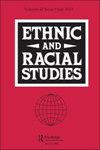Qur’an burning in Norway: stop the Islamisation of Norway (SIAN) and far-right capture of free speech in a Scandinavian context
IF 2
2区 社会学
Q1 ETHNIC STUDIES
引用次数: 0
Abstract
ABSTRACTFringe political actors’ Qur’an desecrations in Scandinavia have over the past few years resulted in international media attention, diplomatic crises, calls for boycotts and pressures from Muslim states and organisations to criminalize such acts. This article explores the historical genealogies of Qur’an desecration – a transnational phenomenon – that emerged in the wake of the post-9/11 ‘Global War on Terror’. In Norway, public Qur’an burnings have been integral to the strategies of the far-right organization Stop the Islamisation of Norway (SIAN) since 2019. Inspired by Titley’s notion of far-right “free speech capture”, we demonstrate that Qur’an burning functions as a powerful symbolic means to incite hatred against Islam and Muslims in the name of “free speech”. We contend that Qur’an burning in the Norwegian context lies at the intersection between transnational and national flows and modalities of Islamophobia.KEYWORDS: Qur’an desecrationQur’an burningfreedom of expressionIslamophobiaMuslimsNorway Disclosure statementNo potential conflict of interest was reported by the author(s).Ethics statementApproval of the research ethics of this study, provisionally entitled INTERSECT: The Hate Speech v. Free Speech Conundrum, reference no. 678679, was granted by NSD/SIKT-Kunnskapssektorens Tjenestesenter in Norway. Informed consent was required from each research participant, and recordings and transcripts stored securely, and deleted after the completion of the study.Notes1 In as much as freedom of expression is a right balanced with other human rights under Norwegian and international law, and Norwegian General Penal Code § 185 prohibits certain forms of hate speech, Kallmyr is of course incorrect in contending that freedom of expression is «unconditional» in Norway.Additional informationFundingThis work was supported by Norges ForskningsrÃ¥d: [Grant Number INTERSECT].在挪威焚烧古兰经:停止挪威的伊斯兰化(SIAN)和极右翼在斯堪的纳维亚背景下对言论自由的攫取
【摘要】在过去的几年里,斯堪的纳维亚半岛边缘政治人物亵渎古兰经的行为引起了国际媒体的关注、外交危机、抵制呼吁以及来自穆斯林国家和组织的压力,要求将此类行为定为刑事犯罪。这篇文章探讨了亵渎古兰经的历史谱系,这是一种跨国现象,出现在9/11后的“全球反恐战争”之后。在挪威,自2019年以来,公开焚烧《古兰经》一直是极右翼组织“停止挪威伊斯兰化”(SIAN)战略的一部分。受Titley极右翼“言论自由捕获”概念的启发,我们证明焚烧古兰经是一种强大的象征性手段,以“言论自由”的名义煽动对伊斯兰教和穆斯林的仇恨。我们认为,在挪威的背景下焚烧《古兰经》是跨国和国家流动与伊斯兰恐惧症形式之间的交集。关键词:亵渎古兰经、焚烧古兰经、言论自由、伊斯兰恐惧症、穆斯林、挪威披露声明作者未报告潜在的利益冲突。伦理声明:批准本研究的研究伦理,临时标题为“相交:仇恨言论与自由言论难题”,参考文献号:678679,由挪威NSD/SIKT-Kunnskapssektorens Tjenestesenter授予。每位研究参与者都需要知情同意,录音和文字记录安全保存,并在研究结束后删除。注1根据挪威法律和国际法,言论自由是一项与其他人权平衡的权利,而且挪威一般刑法第185条禁止某些形式的仇恨言论,Kallmyr声称挪威的言论自由是“无条件的”,这当然是不正确的。本研究得到了Norges ForskningsrÃ¥d:[资助号INTERSECT]的支持。
本文章由计算机程序翻译,如有差异,请以英文原文为准。
求助全文
约1分钟内获得全文
求助全文
来源期刊

Ethnic and Racial Studies
Multiple-
CiteScore
4.60
自引率
8.00%
发文量
258
期刊介绍:
Race, ethnicity and nationalism are at the heart of many of the major social and political issues in the present global environment. New antagonisms have emerged which require a rethinking of traditional theoretical and empirical perspectives. Ethnic and Racial Studies, published ten times a year, is the leading journal for the analysis of these issues throughout the world. The journal provides an interdisciplinary academic forum for the presentation of research and theoretical analysis, drawing on sociology, social policy, anthropology, political science, economics, geography, international relations, history, social psychology and cultural studies.
 求助内容:
求助内容: 应助结果提醒方式:
应助结果提醒方式:


